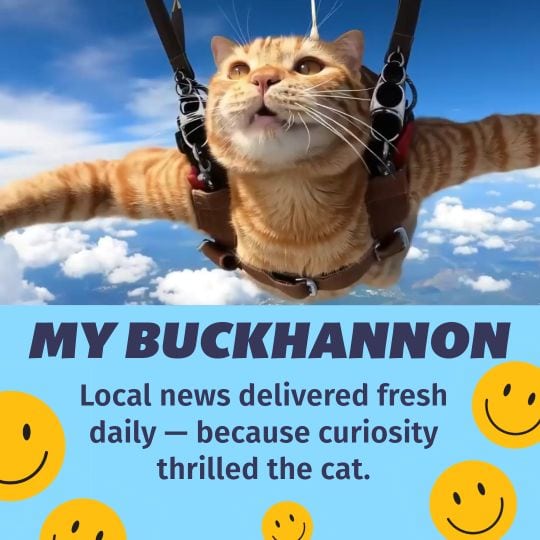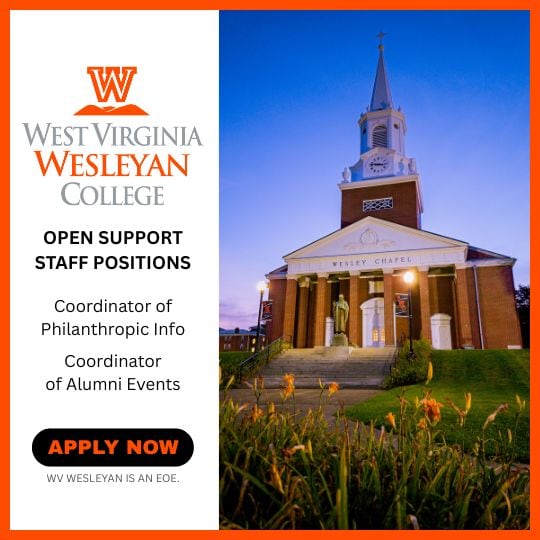BUCKHANNON – The City of Buckhannon’s Planning Commission said city officials and municipal boards need to find a better way to communicate with their constituents.
Mayor Robbie Skinner attended the July 18 Planning Commission meeting to discuss the newly formed Buckhannon Parks and Recreation Advisory Board, but the discussion ultimately circled back to the city’s decision to turn the old Chase Bank drive-thru lot property into a parking lot and green space.
A previous My Buckhannon article about the decision to turn the lot into a green space surrounded by a parking lot can be read here. As such, it will serve as an expansion of Jawbone Park, which is frequently utilized for public, citywide events like Festival Fridays.
“I know there were a lot of people disappointed in the decision made about Madison Street …Do I think a skate park is the right fit over there? No, but am I saying no to a skate park in Buckhannon? Absolutely not,” Skinner said. “I wasn’t crazy about that piece of property purchase from the get-go, so there’s just that that part of it in general, but turning lemons into lemonade, I also see the benefit of having a green space/parking lot in that area for events.”
Skinner hopes the Buckhannon Parks and Recreation Advisory Board may utilize unused space in the parks to work on some of the ideas brought up for the Madison Street property.
“We have a significant opportunity to reinvent wasted space in our main city park on Park Street,” he said. “A lot of trees have been taken down, some of the equipment is tired, and I think we could reimagine some of that to incorporate some of the ideas the group brought up to the Planning Commission … I think as a city government, we need to make an effort to listen to what the youth and what those concerned citizens came to talk to us about and want.”
He said there were several possible opportunities for the park on Park Street, including a trail system, additional basketball courts and even a skatepark.
“I looked at North Buckhannon and there’s significant opportunity over there as well for future for additional development,” Skinner said. “Not every park needs to have playgrounds, not every park needs to be an entertainment center. Some parks just need to be pretty, and the Marion Street Park (Fred W. Brooks Park) is one of those parks that just needs to be pretty, so I think that there’s significant opportunity for development, to make our parks second to none.”
Planning Commission member CJ Rylands said the original purpose of purchasing the lot was to extend Jawbone Park’s capacity.
“As the mayor said, we have resources to make smart investments and my position is that the intention when we purchased that lot was to expand the event capacity of Jawbone Park,” Rylands said. “As far as adding a new parking lot, we have 50,000 square feet of concrete mass, and we’re going to be removing 30,000 square feet of it and turning it into green space with trees. We don’t want to develop the area 100 feet back from Lincoln Street because we think that should be turned back to the residents.”
Rylands said the city also talked to the homeowners around the parking lot and they did not want a skate park located next to their homes.
“I don’t think any neighbor in that area would want that skatepark jammed up on Lincoln Street,” Rylands said. “We beat around the splash park, but you need a level surface and basically in my thinking, the most efficient, effective place for something like that is at the swimming pool, where you already have lifeguards and water treatment.”
Planning commission president Susan Aloi said there should have been more communication following the public meeting and after they made their recommendation to council.
“We made those recommendations with pricing, where it incorporated the skate park into the drawing and said, ‘yes, this is doable,’” Aloi recounted. “We even talked about the concerns of the neighbors and that sort of thing. I think people who advocated for that were under the impression that’s what was going forward. In the absence of hearing any follow-up, the Planning Commission members were also under that impression; we didn’t get any follow-up. I didn’t get any kind of notice anyone would be voting on this or [that] if you still want to advocate for what you recommended, you should come and I know that maybe we should all be going to every city council meeting, but that’s not always going to work with our schedules.”
Planning Commission member Sara Aylestock said it’s also not always easy to determine which meeting to attend or where to access agendas.
“I understand the agendas are on the city’s website – and that’s great – but the city council meetings are super, crazy long,” Aylestock said. “There’s a ton of stuff on the agenda, it goes way into the evening and is not always accessible for the average person, and there’s like a gazillion different boards. I know that’s not a proper term, but there are a lot of them and not everyone knows which board is covering which project they’re interested in.”
City Recorder Randy Sanders said the city could have communicated the final decisions and the reasons behind them more clearly.
“I will not pretend to speak for all council members, but I’ll speak for myself, and I think we probably dropped the ball a little bit,” Sanders said. “We should have had some more meetings and we should have vetted it more and explained why we were making the decisions we were making.”
Skinner said he agreed it was probably harder for the public to keep track of all the city’s meetings.
“I see Sara’s point — I think it’s easy for us to think the schedule is clear as a bell because this is our life,” Skinner said. “We are used to the cadence of these meetings and how the agendas go out and we get all the emails in the world, but I think it’s easy to forget that a citizen does not see everything we do, and CJ has said before and I agree with the statement [that], ‘you’re only as good as the information you have in front of you to make the decision.’”
“We have arguably the most information of anybody because we’re the ones that ultimately have to make the decisions for the community, so I think it’s easy for folks to be misinformed, misinterpret things and disagree easily with decisions made because all the information is not out there as easily,” the mayor added.
Skinner said he didn’t want anyone to think the city disregarded their suggestions without first considering their merit.
“I really feel bad those folks believe they were just shoved aside and no one cares what they think; I really don’t believe that’s true,” Skinner said. “We just have to channel this the right way, to be intelligent about where these developments are going to be located that best serve the people.”













